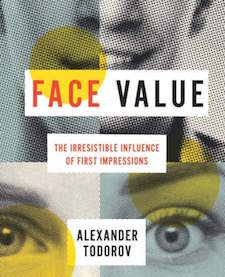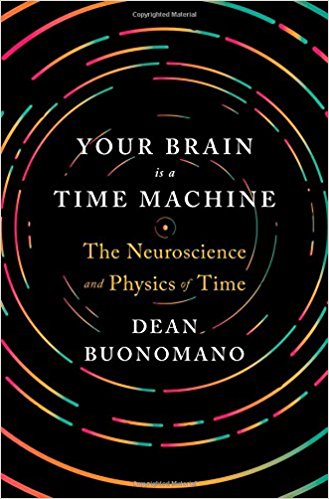If psychology teaches one thing, it’s this: The mind distorts reality. Whether it’s the way we perceive space, our flawed memory of events, or unconscious bias that leads us to endow people with traits they don’t have, humans universally take in information about the environment and construct a version of it that may not square with reality.

BOOK REVIEW — “Face Value: The Irresistible Influence of First Impressions,” by Alexander Todorov (Princeton University Press, 336 pages), and “Your Brain is a Time Machine: The Neuroscience and Physics of Time,” by Dean Buonomano (W.W. Norton, 304 pages).
Two new books delve into the concept of faulty perception, contributing academic rigor to the subject and providing some helpful correctives for those of us who’d like to try to see the world as it is.
In “Face Value: The Irresistible Influence of First Impressions,” Alexander Todorov makes a forceful case that those impressions should not be trusted. A Princeton psychology professor who is regarded as the foremost researcher in this particular field, Todorov has spent years exploring the inferences we draw from one another’s faces. And not only does he show that these impressions are often at odds with reality: He takes it a couple of steps further, showing that we make similar judgments based on specific characteristics of faces — and these judgments influence our behavior.
“Face Value” begins with a history of physiognomy — the pseudoscience that claims that physical characteristics are directly linked to character attributes. Johann Kaspar Lavater, an 18th-century poet, philosopher, and early “superstar” of physiognomy (as Todorov puts it), called the practice “the talent of discovering the interior man by the exterior appearance” — the width of a nose, the space between eyes.
This so-called discipline clearly has its foundations in racism, and no reputable scientist would take it seriously today. But Todorov looks at how the ancient concept lives on. “We are all naive physiognomists,” he writes. From a detail as trivial as whether someone’s eyebrows angle up or down, “we form instantaneous impressions and act on these impressions.”
The practice is problematic, to say the least. While humans make first impressions automatically, the conclusions we draw are inherently off base. A quick glance makes us instantly differentiate between “who looks like a good guy and who looks like a bad guy,” Todorov writes, adding: “Studies show that our face stereotypes are not random or completely subjective. We agree on our first impressions, and these impressions can be manipulated.”
This is not to say that first impressions serve no purpose at all. Detecting age or sex clearly holds value from an evolutionary perspective, and can serve important social functions in the here and now. But we need to be wary of making “too much out of too little information,” Todorov writes. This is especially so when it comes to voting, where “gender stereotypes are hard to beat” and “dominant looks” are “bad news for women candidates regardless of whether they were conservative or liberal.”
While Todorov focuses on the systematic, predictable relationship between appearance and impressions, Dean Buonomano, a professor of neurobiology and psychology at UCLA, looks at the psychology behind another perception, albeit one without a material presence: the concept of time.
In “Your Brain Is a Time Machine: The Neuroscience and Physics of Time,” Buonomano delves into the science and philosophy of one of humankind’s most fundamental organizing principles. Time, he argues, has no real parallels. It is one of the few features of our lives that have no roots in the physical — and yet, he argues, it’s often described in terms that allude to space (“a long time,” “20/20 hindsight”).
More important than time itself, he argues, is what the brain’s calculations can tell us about how the human mind works: “Without an understanding of how the human brain tells time, perceives time, and represents time, it will not be possible to understand the human mind.”
For all of us who have been overwhelmed by the complexity of time, Buonomano’s book flips the script on its head. It is not time that is complicated — it is our human minds.
“Your brain is the best time machine you will ever own,” he writes. It is both “an anticipation machine and a machine that tells time.”
Buonomano’s scientific investigation leaves few stones unturned. He explores how time feels, how time shapes memory, our (faulty) estimation of the duration of time, the concept of jet lag, circadian clocks, how dopamine influences our perception of time, how the synapses in our brains create connections that give us clues about the passage of time. And he examines the significance and the physics of the concept of time travel.
While Todorov’s book draws readers in quickly with its compelling narrative voice and clear prose, Buonomano’s seems more geared to an academic audience. Some of his detailed explanations of the physics of temporal patterns could be difficult going for a lay reader.
But both books raise the same fundamental question: Can we trust our perceptions, or are they (as Buonomano asks about our perception of the passage of time) an illusion? Both make direct links to how these perceptions influence our relationships. What does the perception of time teach us about ourselves? How do faces influence our (literal) views of each other? How do we make snap judgments, and how does our behavior reflect our preconceptions?
Of course, becoming aware of our biases doesn’t make us immune to them. Overcoming bias requires active participation. When it comes to faces, for example, the psychologist Mahzarin Banaji recommends surrounding yourself with a diverse set, (perhaps by having them rotate on your screen saver). Without such training, we are all too likely to be led astray in such critical matters as deciding who should be given a mortgage, who is best qualified for a job, and who should be elected president.
As these two timely and important books show, there is nothing inherently valuable in a minute, a second, a handsome smile. It’s all in what the mind makes of it.
Hope Reese is a writer and editor in Louisville, Kentucky. Her writing has appeared in Undark, The Atlantic, The Boston Globe, The Chicago Tribune, Playboy, Vox, and other publications.












Comments are automatically closed one year after article publication. Archived comments are below.
Time is far from unknown, Published a book recently, In Search of Enchantment and the Paranormal, A fire in the mind, Amazon copyright 1998 and 2002. Experiencer still… You live in a mind that dies and time that ends. Tis not so. What is sleep, dreaming, visions, you can affect a dream and a vision. Everyone has precognition. What is threatening the earth and how can you know. An enchantment upon the human mind. Why students in america have trouble learning. Why Americans take twenty seven percent fewer steps than chinese. My second book about life after death. The crashes of American planes and destroyers have a link. Lifting the enchantment and the paralysis. Three hundred fifty pages, some good and some bad. Time is coordinate and space is not… My own work from my experiences . Some included.
It happens in the mind and that ends it does not end it if the mind( second book) mentioned in first.